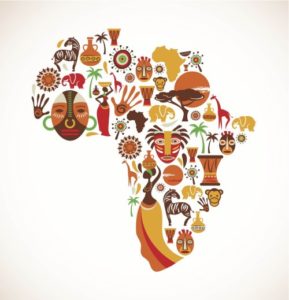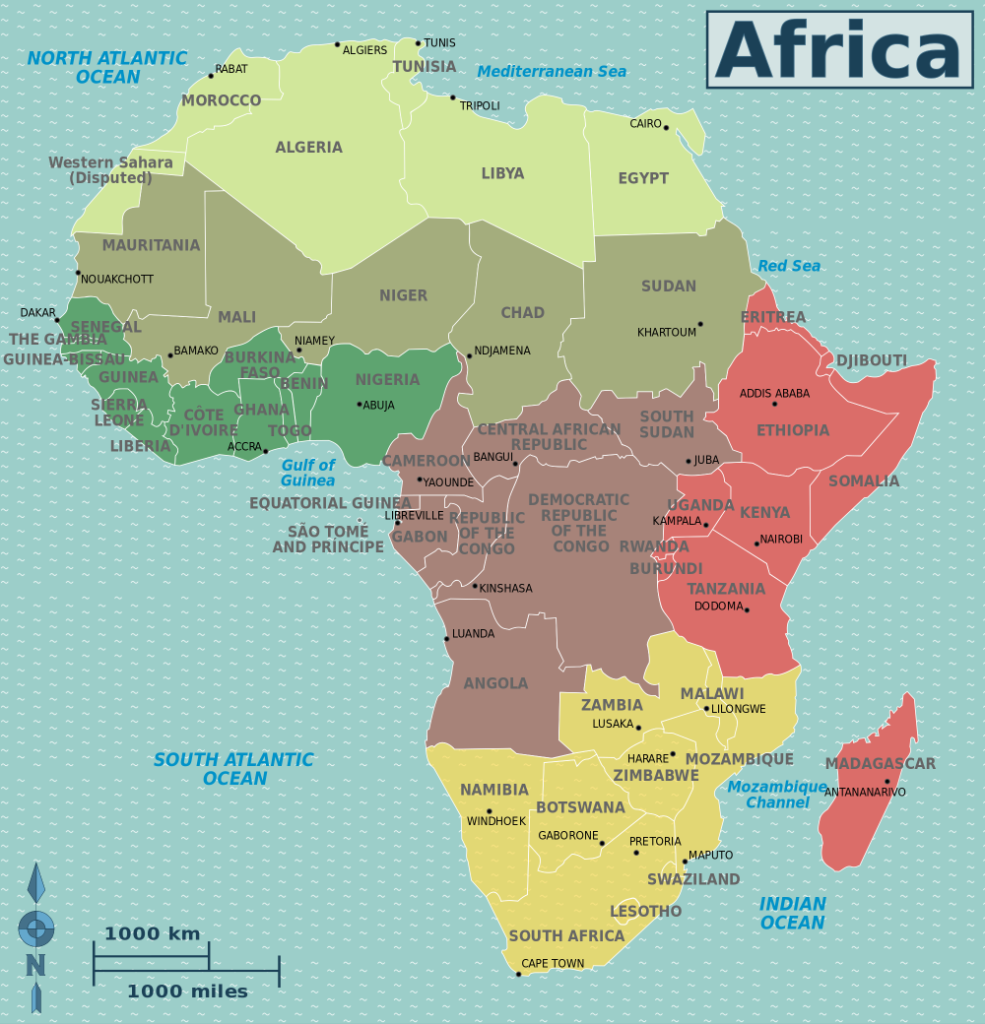
About Africa
Africa is a blessed continent!
The diversity of landscapes, cultures, wild life, ethnic groups and cuisine will make one life time too short to explore it all.
It is the world’s second-largest and second-most-populous continent (the first being Asia). At about 30.3 million km2 (11.7 million square miles) including adjacent islands, it covers 6% of Earth’s total surface area and 20.4% of its total land area.
With 1.2 billion people as of 2016, it accounts for about 16% of the world’s human population. The continent is surrounded by the Mediterranean Sea to the north, both the Suez Canal and the Red Sea along the Sinai Peninsula to the northeast, the Indian Ocean to the southeast and the Atlantic Ocean to the west. The continent includes Madagascar and various archipelagos. It contains 54 fully recognised sovereign states (countries), nine territories and two de facto independent states with limited or no recognition.[3]
 Africa’s average population is the youngest amongst all the continents; the median age in 2012 was 19.7, when the worldwide median age was 30.4. Algeria is Africa’s largest country by area, and Nigeria is its largest by population. Africa, particularly central Eastern Africa, is widely accepted as the place of origin of humans and the Hominidae clade (great apes), as evidenced by the discovery of the earliest hominids and their ancestors, as well as later ones that have been dated to around seven million years ago, including Sahelanthropus tchadensis, Australopithecus africanus, A. afarensis, Homo erectus, H. habilis and H. ergaster—with the earliest Homo sapiens (modern human) found in Ethiopia being dated to circa 200,000 years ago. Africa straddles the equator and encompasses numerous climate areas; it is the only continent to stretch from the northern temperate to southern temperate zones.
Africa’s average population is the youngest amongst all the continents; the median age in 2012 was 19.7, when the worldwide median age was 30.4. Algeria is Africa’s largest country by area, and Nigeria is its largest by population. Africa, particularly central Eastern Africa, is widely accepted as the place of origin of humans and the Hominidae clade (great apes), as evidenced by the discovery of the earliest hominids and their ancestors, as well as later ones that have been dated to around seven million years ago, including Sahelanthropus tchadensis, Australopithecus africanus, A. afarensis, Homo erectus, H. habilis and H. ergaster—with the earliest Homo sapiens (modern human) found in Ethiopia being dated to circa 200,000 years ago. Africa straddles the equator and encompasses numerous climate areas; it is the only continent to stretch from the northern temperate to southern temperate zones.
Africa hosts a large diversity of ethnicities, cultures and languages. In the late 19th century European countries colonised almost all of Africa. Africa also varies greatly with regard to environments, economics, historical ties and government systems. However, most present states in Africa originate from a process of decolonisation in the 20th century. African nations have attempted to cooperate through the establishment of the African Union, which is headquartered in Addis Ababa.
TOURISM
Tourism is an important economic sector for many countries in Africa. The four countries that benefit the most from tourism are Egypt, Tunisia, Morocco and South Africa. A second category includes the countries of Namibia, Botswana, Mozambique, Tanzania and Kenya.
The continent of Africa can be divided into three groups relative to tourism:
- those countries with a developed tourism industry;
- those with a developing industry;
- those that would like to develop a tourism industry.

Countries like Egypt, South Africa, Morocco, and Tunisia have a successful tourism industry. Countries like Kenya, Zimbabwe, Swaziland and Mauritius can be considered as countries that have steady and consistent income from tourism. Countries like Tanzania, Algeria and Burundi are countries that have little economic benefit from tourism, but would like to see it expand.
The successful countries in tourism are thriving due to a variety of factors. Countries like Morocco and Tunisia benefit from their beautiful beaches and their relative proximity to Europe. Tourism in Egypt is based on the rich history of Ancient Egypt, pyramids and artefacts. South Africa and Kenya benefit from wild safari expeditions, attracting tourists to see the wildlife of Africa.
Rwanda & Uganda are other two countries that are successfully trying to increase their stake from the tourism dollars pie!
